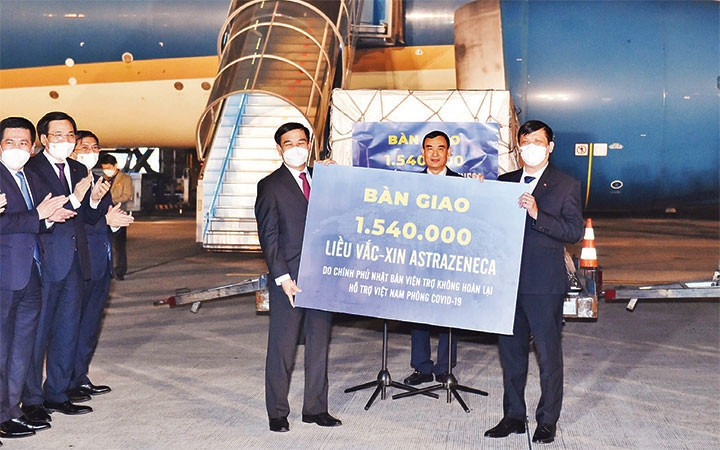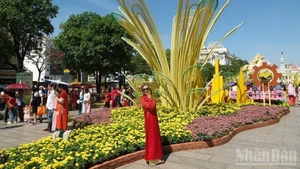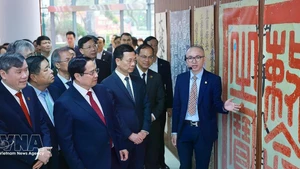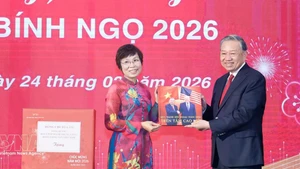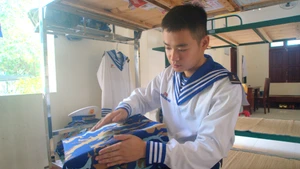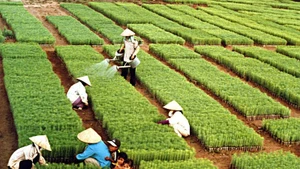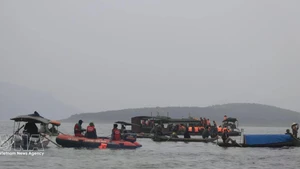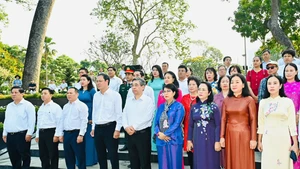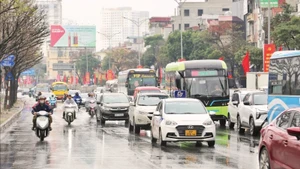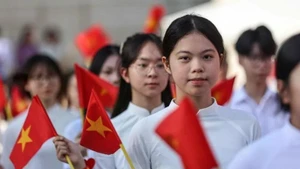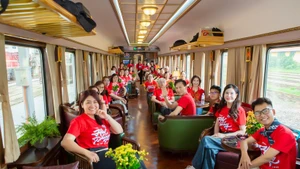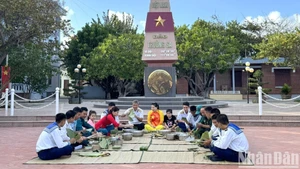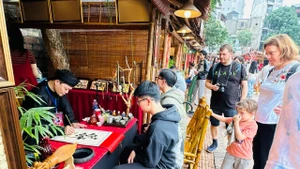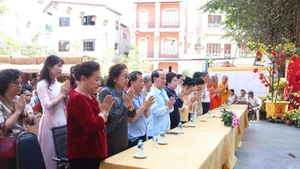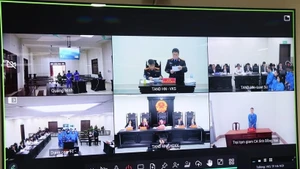A day earlier, Vabiotech Company under the Ministry of Health announced the successful production of the first batch of COVID-19 Sputnik V vaccine in Vietnam, which was assessed by Russian partners as meeting the requirements.
The two events not only coincided in time but also marked Vietnam's excellent achievements in vaccine diplomacy, greatly contributing to the fight against COVID-19 as vaccination is an important requirement in bringing the country into a new normal of economic recovery and development.
Helping others also means helping yourself
On the plane carrying President Nguyen Xuan Phuc that day, there were 1.05 million doses of Abdala vaccine donated by Cuba to Vietnam to serve pandemic prevention and control in Vietnam. During the President’s working visit, the partners committed to donate a large volume of vaccines to Vietnam. Pfizer company committed to deliver 31 million doses of vaccine to Vietnam in 2021 and 20 million doses of vaccine for children. Many other partners and Vietnamese in the US also donated medical products worth about 8.8 million USD to Vietnam.
In the past year, there were many flights carrying batches of vaccines to Vietnam from many sources, including batches of aid donated to Vietnam to repay Vietnam's kindness for supporting them in the early stages of pandemic fighting.
In the context that many countries were racing to access scarce vaccine supplies and many countries were unwilling to share vaccine production technology, Vietnam’s achievements in vaccine diplomacy were very encouraging.
Countries that have traditional relations with Vietnam and can produce COVID-19 vaccines or therapeutic drugs have provided and supported Vietnam with valuable doses of vaccines and medical supplies. Vaccine diplomacy has helped bring in new vaccine production technologies, contributing to the development of Vietnam into a self-sufficient country in terms of vaccines against COVID-19.
Despite many difficulties in economic development and fighting the pandemic, Cuba was ready to share vaccine resources and production technology with Vietnam.
According to Vietnamese Ambassador to the Czech Republic Thai Xuan Dung, the Czech Republic was not a vaccine producer, but it also decided to provide vaccines for Vietnam. The Vietnamese government and people as well as the Vietnamese community in the Czech Republic organised practical activities to support the Czech Republic’s fight against the pandemic, such as sewing masks, donating medical supplies, and providing meals for the frontline forces.
Vietnam also received vaccine aid from leading countries in vaccine production such as the US and was on the US's list of priority countries for vaccine supply. Vietnam was the first ASEAN country to receive vaccine support from Australia as well as the first foreign country outside Europe to receive vaccines and medical equipment and supplies from Poland.
Other countries also showed their gratitude for Vietnam's aid of masks and anti-pandemic supplies during the early outbreak of the pandemic. When handing over the vaccine to Vietnam, the Polish side considered Vietnam's sharing as an expression of the traditional friendship and their aid to Vietnam as Poland's obligation in return for Vietnam’s assistance.
Significant numbers
Previously, Vietnam had never deployed vaccine diplomacy, so such fruits can be said to be beyond expectations. As of January 10, 2022, the whole country had injected nearly 160 million doses of COVID-19 vaccines. Vietnam's vaccination rate in November 2021 was ranked third in the world, just after China and India.
Vietnamese Ambassador to the US Ha Kim Ngoc said that the US provided Vietnam a total of about 24.6 million doses of vaccines, mainly Pfizer vaccine, from July 10 to mid-December 2021. The number was one-third of the US’s total vaccine aid to Southeast Asian countries.
According to the non-profit organisation Kaiser Family Foundation (KFF), Vietnam ranks second in the group of ten countries receiving the most vaccines from the US as of December 12, 2021.
It can be said that vaccine diplomacy plays an important role in successfully implementing the strategy of flexible adaptation to and effective control of the COVID-19 pandemic while Vietnam has yet to become self-sufficient in vaccines.
When the fourth outbreak of the pandemic appeared, with the establishment of the Government Working Group on Vaccine Diplomacy, vaccine diplomacy was strongly and comprehensively promoted with the participation of all ministries and sectors.
Vaccine diplomacy was conducted aggressively and methodically at a high level in many forms. The topic of vaccine support, vaccine production cooperation, and production technology transfer was always a priority in the visits of Vietnamese leaders to other countries as well as in bilateral meetings and international forums.
It is estimated that Vietnamese leaders have conducted nearly 100 phone calls and online exchanges and sent letters to leaders of 20 countries and major vaccine manufacturers and corporations in the world in a bid to promote cooperation in vaccine supply and anti-pandemic efforts.
On the front lines of vaccine diplomacy
In the success story of vaccine diplomacy, it must mention the role of Vietnam's diplomatic missions abroad. The Vietnamese Embassy in India established a Rapid Response Team on Medicines and Vaccines to reach a commitment of providing one million doses of India’s Remdesivir's antiviral drug for Vietnam in addition to vaccines, production technology and production materials.
According to Vietnamese Ambassador to Poland Nguyen Hung, Vietnam was not among Poland’s priority countries to provide vaccines, but through the advocacy via many diplomatic channels including the letter from Prime Minister Pham Minh Chinh sent to the Polish Prime Minister, Poland soon offered support to Vietnam.
In Italy, Ambassador Nguyen Thi Bich Hue said that the staff at the Vietnamese Embassy was divided into different advocacy groups for each agency of the host country such that Italy would provide vaccines for Vietnam. “In difficulties, I feel true friendship,” said Ambassador Nguyen Thi Bich Hue. She also expressed her sincere thanks for all the support given to Vietnam during the difficult time.
Ambassador Ha Kim Ngoc said that campaigning for vaccines in the US was a fierce race among many countries. It is worth mentioning that, due to good anti-pandemic achievements, Vietnam was not initially included in the priority list for vaccine aid by the US. Thanks to high-level coordination and action (such as President Nguyen Xuan Phuc sending a letter to the US President and the Vietnamese Foreign Minister speaking by phone with the US Secretary of State) together with the efforts of the Vietnamese Embassy in the US, Vietnam has received a large vaccine donation from the US that any country would wish to have.
The letter from the Vietnamese President to the US President was prepared in a record short time and at the same time, the Vietnamese Prime Minister signed a decision that Vietnam would contribute 500,000 USD to the COVAX mechanism, affirming that Vietnam is a responsible partner in the global joint effort to combat the COVID-19 pandemic.
It is forecast that the year 2022 will continue to be an anxious year for the world and vaccines will still be a “weapon” that all countries wants to own, including Vietnam. The Government's Working Group on Vaccine Diplomacy has planned to purchase vaccines in 2022 to administer children and the booster doses for adults in addition to buying drugs to treat COVID-19 and improving the capacity of grassroots healthcare and preventive medicine.
The success story of Vietnam's vaccine diplomacy needs to be spread as a valuable lesson on promoting the foreign policy of independence, self-reliance, multilateralisation, and diversification of external relations.
